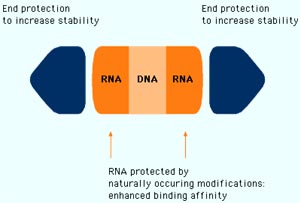GeneBloc technology

figure 1
atugen is following two key approaches to discover and validate new targets, ribozymes and its GeneBloc technology. With regard to ribozymes, Atugen is developing conditional and tissue-specific ribozyme-based gene-knockdown services, in which vectors encoding a ribozyme are used to create transgenic animals that express the ribozyme in a conditional or tissue-specific manner. (Since ribozymes have the chemistry of natural RNA, they can be encoded in a vector and expressed in a transgenic animal.)
For the GeneBloc technology, Atugen researchers start with a partial (e.g., an EST) or full-length cDNA sequence for a gene of interest. Atugen analyzes the function and relevance of that gene to disease processes by using the proprietary GeneBloc technology. GeneBlocs are small synthetic DNA/RNA hybrid molecules that bind to a target mRNA with high affinity and specificity, and induce its destruction by RNase H (an enzyme that selectively degrades the RNA strand of DNA/RNA hybrids). GeneBlocs are constructed with a minimum content of antisense DNA to provide stability and low toxicity. Other modifications are made at the terminal ends of the GeneBloc molecules provide further stability (figure 1). As a result, GeneBlocs remain active over several days.
atugen has developed numerous lipid formulations to deliver GeneBlocs into mammalian cells. The company says that it typically achieves more than 95% transfection efficiency for most cell lines, and that it also achieves sustained delivery of GeneBlocs over several days in cell culture.
Using these tools, atugen can help pharmaceutical and biotechnology companies at several steps in the drug discovery pipeline: GeneBlocs can be applied for target discovery, target validation, small molecule lead optimization, and pre-clinical testing. As explained by Klaus Giese, the company’s vice president of research: "The GeneBloc technology is used internally to identify and functional validate genes involved in the progression of human prostate and breast cancer cells to the metastatic state. We have already identified several crucial candidates that when knocked-down in an animal model prevents metastasis".
There are other applications of the technology. GeneBlocs can be designed to knock down an entire gene family, or they can be targeted at specific family members only (figure 2). They can also be designed to target specific splice variants; such an approach is possible because these reagents can destroy target mRNAs by binding to any region of the target molecule. Thus, for example, one can design GeneBlocs that bind to nucleic acid sequences that are conserved within a gene family, or that bind to sequences that are unique to a single family member. In addition, GeneBlocs can be used to optimize small molecule leads. In this program, atugen compares the gene expression patterns induced after GeneBloc or small molecule treatment directed against the same target. "Using this technology, we have identified genes that are exclusively regulated by an important cellular enzyme phosphatidyl-inositol 3-kinase" says Klaus Giese.
Media Contact
Weitere Informationen:
http://www.atugen.comAlle Nachrichten aus der Kategorie: Biowissenschaften Chemie
Der innovations-report bietet im Bereich der "Life Sciences" Berichte und Artikel über Anwendungen und wissenschaftliche Erkenntnisse der modernen Biologie, der Chemie und der Humanmedizin.
Unter anderem finden Sie Wissenswertes aus den Teilbereichen: Bakteriologie, Biochemie, Bionik, Bioinformatik, Biophysik, Biotechnologie, Genetik, Geobotanik, Humanbiologie, Meeresbiologie, Mikrobiologie, Molekularbiologie, Zellbiologie, Zoologie, Bioanorganische Chemie, Mikrochemie und Umweltchemie.
Neueste Beiträge

Nanofasern-befreien Wasser von gefährlichen Farbstoffen
Farbstoffe, wie sie zum Beispiel in der Textilindustrie verwendet werden, sind ein großes Umweltproblem. An der TU Wien entwickelte man nun effiziente Filter dafür – mit Hilfe von Zellulose-Abfällen. Abfall…

Entscheidender Durchbruch für die Batterieproduktion
Energie speichern und nutzen mit innovativen Schwefelkathoden. HU-Forschungsteam entwickelt Grundlagen für nachhaltige Batterietechnologie. Elektromobilität und portable elektronische Geräte wie Laptop und Handy sind ohne die Verwendung von Lithium-Ionen-Batterien undenkbar. Das…

Wenn Immunzellen den Körper bewegungsunfähig machen
Weltweit erste Therapie der systemischen Sklerose mit einer onkologischen Immuntherapie am LMU Klinikum München. Es ist ein durchaus spektakulärer Fall: Nach einem mehrwöchigen Behandlungszyklus mit einem immuntherapeutischen Krebsmedikament hat ein…





















